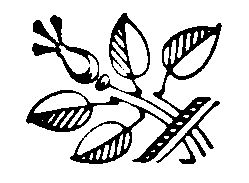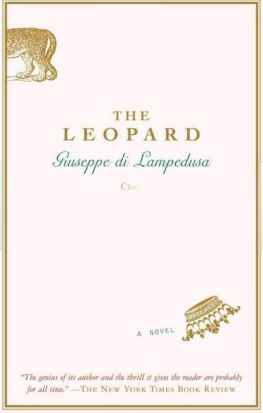
THE LEOPARD
Guiseppe Di Lampedusa
Copyright, 1960
ABOUT THE AUTHOR
Born in Palermo in 1896, Giuseppe di Lampedusa was a cosmopolitan Sicilian prince who married a Baltic noblewoman and hadlived in London and Paris, but who nevertheless was tied strongly to the island of his birth. He knew several languages well andhad read in the original the best of all European literature. In his palace in Palermo he met regularly with a group of youngfriends to study French literature, and, to the last, his days were spent in readings and discussions with his wife and friends.For twenty-five years Lampedusa meditated a novel based on the figure of his paternal great-grandfather and set in Sicily duringthe Garibaldian era. Yet he was sixty before he finally began to write it, and he completed it only a few months before his death.Shortly before he died in 1957, he was told by an Italian editor that his novel was unpublishable. It was not until many monthslater that an unsigned copy of his manuscript reached an enthusiastic editor, whose prompt inquiries brought to light the storybehind the prince who never published anything in his lifetime, but left a masterpiece after his death.
HISTORICAL NOTE
This book opens when the Bourbon state of Naples and Sicily, called the Kingdom of the Two Sicilies, was about to end. King Ferdinand II ("Bomba") had just died; and the whole Italian peninsula would soon be one state for the first time since the fall of the Roman Empire.
The Risorgimento, as this movement for unification came to be known, had been gathering strength since the occupation of the North by the Austrians after the Napoleonic Wars, and had already come to a head once, in 1848Leadership had now fallen mainly to Piedmont, the socalled Kingdom of Sardinia, ruled from Turin by Victor Emmanuel of Savoy, with Cavour as his Prime Minister.
Early in May, 186o, the popular hero Garibaldi, acting against Cavour's wishes, sailed from near Genoa with a thousand volunteers for Sicily, to win the island from the Bourbons. The Redshirts, or "Garibaldini," landed at Marsala, defeated the Bourbon troops at Calatafimi, and within three weeks had occupied the capital, Palermo. Garibaldi, hailed as "Dictator" of Sicily, gathered more volunteers, crossed to the mainland, swept up the coast, and entered Naples in triumph. That autumn the Bourbon armies were defeated on the Volturno, the Pledmontese besieged the last Bourbon King, Francis II, in Gaeta, and Garibaldi handed over southern Italy to King Victor Emmanuel; he then withdrew to private life. Plebiscites were held; every state in the peninsula agreed to join the new united Kingdom, except the Papal States, which were occupied, for reasons of internal French politics, by troops of Napoleon III. In 1862 Garibaldi tried to force this issue and march on Rome. But on the slopes of Aspromonte in Calabria his men were routed and he himself was wounded by Piedmontese troops. This action by Italian government forces ended the revolutionary phase of the Risorgimento, which culminated officially ;n the declaration of Rome as capital of Italy in 1870.
CONTENTS
I
Introduction to the Prince
2
Donnafagata
3
The Troubles of Don Fabrizio
4
Love at Donnafugata
5
Father Pirrone Pays A Visit
6
A Ball
7
Death Of a Prince
8
Relics

Introduction to the Prince
Rosary and introduction to the Prince - The garden and the dead soldier - Royal audiences - Dinner - A carriage to Palermo -Going to Mariannina's - Conversation with Tancredi - In the office; estates and politics - In the observatory with Father Pirrone -Relaxation at luncheon Don Fabrizio and the peasants - Don Fabrizio and his son Paolo - News of the landing, and Rosary again MAY, 1860
NUNC ET IN HORA MORTIS NOSTRAE. AMEN.
The daily recital of the Rosary was over. For half an hour the steady voice of the Prince had recalled the Glorious and the Sorrowful Mysteries; for half an hour other voices had interwoven a lilting hum from which, now and again, would chime some unlikely word: love, virginity, death; and during that hum the whole aspect of the rococo drawing room seemed to change; even the parrots spreading iridescent wings over the silken walls appeared abashed; even the Magdalen between the two windows looked a penitent and not just a handsome blonde lost in some dubious daydream, as she usually was. Now, as the voices fell silent, everything dropped back into its usual order or disorder. Bendico, the great Dane, vexed at having been shut out, came barking through the door by which the servants had left. The women rose slowly to their feet, their oscillating skirts as they withdrew baring bit by bit the naked figures from mythology painted all over the milky depths of the tiles. Only an Andromeda remained covered by the soutane of Father Pirrone, still deep in extra prayer, and it was some time before she could sight the silvery Perseus swooping down to her aid and her kiss.
The divinities frescoed on the ceiling awoke. The troops of Tritons and Dryads, hurtling across from hill and sea amid clouds of cyclamen pink toward a transfigured Conca d'Oro, (literally "Golden Shell," is the name of the hills encircling Palermo) and bent on glorifying the House of Salina, seemed suddenly so overwhelmed with exaltation as to discard the most elementary rules of perspective; meanwhile the major Gods and Goddesses, the Princes among Gods, thunderous Jove and frowning Mars and languid Venus, had already preceded the mob of minor deities and were amiably supporting the blue armorial shield of the Leopard. They knew that for the next twenty-three and a half hours they would be lords of the villa once again. On the walls the monkeys went back to pulling faces at the cockatoos.
Beneath this Palermitan Olympus the mortals of the House of Salina were also dropping speedily from mystic spheres. The girls resettled the folds in their dresses, exchanged blue-eyed glances and snatches of schoolgirl slang; for over a month, ever since the
"riots" of the Fourth of April, they had been home for safety's sake from their convent, and regretting the canopied dormitories and collective coziness of the Holy Redeemer. The boys were already scuffling with each other for possession of a medal of San Francesco di Paola; the eldest, the heir, the young Duke Paolo, was longing to smoke and, afraid of doing so in his parents'
presence, was fondling the outside of his pocket in which lurked a braided-straw cigar case. His gaunt face was veiled in brooding melancholy; it had been a bad day: Guiscard, his Irish sorrel, had seemed off form, and Fanny had apparently been unable (or unwilling) to send him her usual lilac-tinted billet-doux. Of what avail then, to him, was the Incarnation of his Saviour?
Restless and domineering, the Princess dropped her rosary brusquely into her jet-fringed bag, while her fine crazy eyes glanced around at her slaves of children and her tyrant of a husband, over whom her diminutive body vainly yearned for loving dominion. Meanwhile he himself, the Prince, had risen to his feet; the sudden movement of his huge frame made the floor tremble, and a glint of pride flashed in his light blue eyes at this fleeting confirmation of his lordship over both human beings and their works. Now he was settling the huge scarlet missal on the chair which had been in front of him during his recitation of the Rosary, putting back the handkerchief on which he had been kneeling, and a touch of irritation clouded his brow as his eye fell on a tiny coffee stain which had had the presumption, since that morning, to fleck the vast white expanse of his waistcoat. Not that he was fat; just very large and very strong; in houses inhabited by common mortals -his head would touch the lowest rosette on the chandeliers; his fingers could twist a ducat coin as if it were mere paper; and there was constant coming and going between Villa Salina and a silversmith's for the mending of forks and spoons which, in some fit of controlled rage at table, he had coiled into a hoop, But those fingers could also stroke and handle with the most exquisite delicacy, as his wife Maria Stella knew only too well; and up in his private observatory at the top of the house the gleaming screws, caps, and studs of the telescopes, lenses, and "comet-finders" would answer to his lightest touch.
Next page












